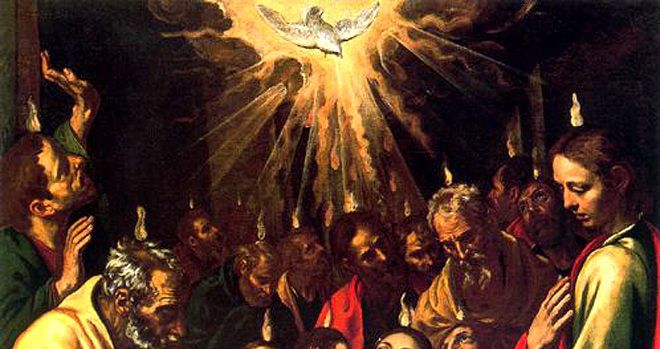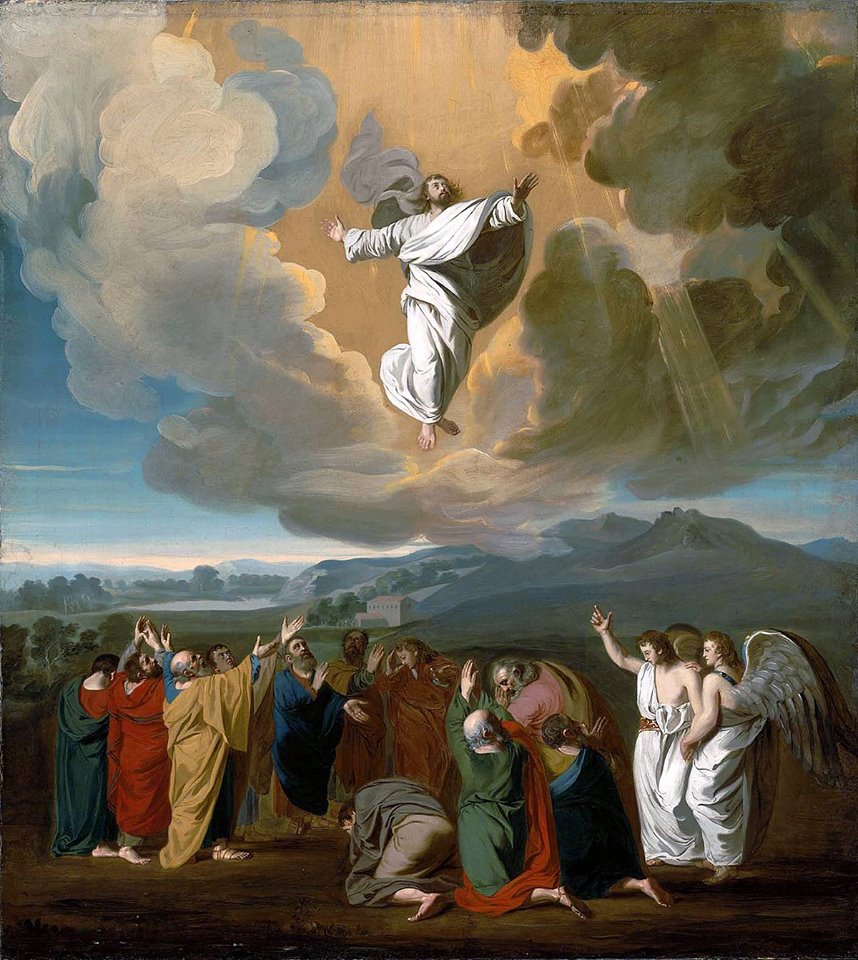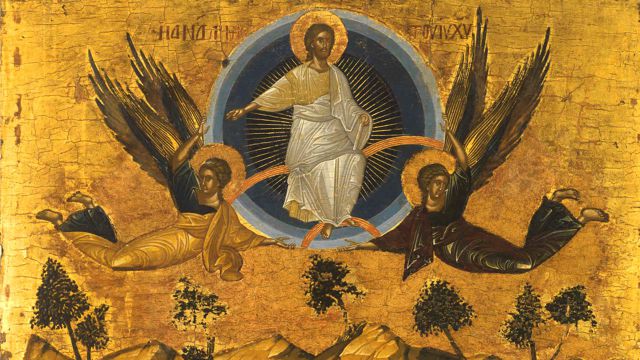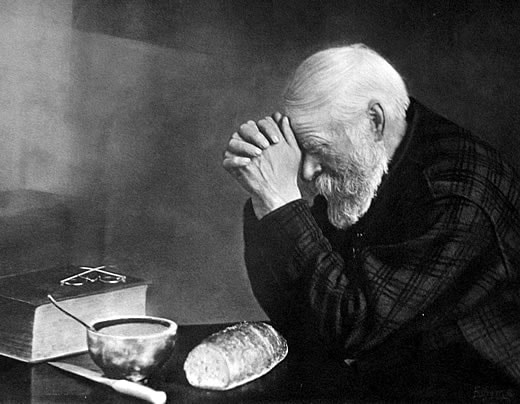John 14:13-31
Acts 2:1-24
May 20, 2018
When you think of Pentecost, what do you think of? A rushing wind? Tongues of fire dancing on the heads of Christ's disciples? Uneducated Galileans speaking in languages they've never learned? Yes, these things did indeed happen on that first Pentecost of the New Testament and a preacher can hardly preach a Pentecost sermon without mentioning these happenings.
Of course, Pentecost commemorates Jesus sending the promised Holy Spirit, the Comforter. And we Christians today certainly want to receive the Holy Spirit, as we just sang, "Come Holy Ghost, God and Lord, with all your graces now outpoured..." So, it's an appropriate question this Pentecost morning, "How do we receive the Holy Spirit?"
Many seek to receive the Holy Spirit by duplicating the signs that accompanied the Holy Spirit on Pentecost. Men and women prophesying and speaking in tongues, they've never learned. Others perform miracles, healings and such to prove that they have the Holy Spirit. And Jesus did say at his Ascension as recorded in Mark chapter 16, "And these signs will accompany those who believe: in my name they will cast out demons; they will speak in new tongues; they will pick up serpents with their hands; and if they drink any deadly poison, it will not hurt them; they will lay their hands on the sick, and they will recover." (vss. 17-18)
Yet, it is important to note that Jesus did not promise that these signs would continue to accompany his Church forever. In fact, St. Paul says in Romans chapter 13 that such gifts of the Spirit would cease. Neither are these signs the actual gifts that the Holy Spirit brings, but merely signs that accompany the Holy Spirit's work. The tongues of fire, the speaking in tongues, the healings; they are all adornments to show the world that the Holy Spirit is working. But to confuse such adornments with the actual gifts we should seek to receive from the Holy Spirit is like focusing on the wrapping paper instead of the actual gift.
A bride wears a beautiful wedding dress at her wedding. She does this to adorn herself as she presents herself to her groom. She does this also so that everyone knows who the bride is. Yet, on my wedding day, even if the wedding dress were the most beautiful gown ever worn upon this earth, adorned with jewels and made of the finest materials, if my wife were not wearing the dress, I would not be pleased. The wedding dress is simply adornment! That's not to say that it isn't important. But unless it is worn by the true bride, it's just a dress. And a bride doesn't wear her wedding dress throughout her entire marriage, yet she still remains her husband's bride.
Jesus says in our Gospel lesson, "If anyone loves me, he will keep my word, and my Father will love him, and we will come to him and make our home with him. Whoever does not love me does not keep my words." And again, "But the Holy Spirit, whom the Father will send in my name, he will teach you all things and bring to your remembrance all that I have said to you." If you love Jesus, you love his word. When Jesus promised the Holy Spirit, he was promising above all else to send his comforting and powerful word. The tongues of fire and different languages were the adornments, like a wedding dress on a bride. But the word that they preached by the Spirit was the beautiful face of the bride. This is why those, who heard their words gladly said, "we hear them telling in our own tongues the mighty works of God."
These mighty works of God are the suffering, death, and resurrection of Jesus Christ, which we heard St. Peter himself preach in his Pentecost sermon. And all those speaking in tongues were preaching the same thing yet using different passages from Scripture to prove the Gospel. It is this word of the Gospel, the mighty work of salvation, which Christ our Lord accomplished through his cross, which is the true gift of the Holy Spirit. This is the comfort and peace, which the world cannot give. And this is what those who love Jesus desire to hear and learn and cherish, just as a groom desires to see the face of his bride much more than her wedding dress.
A few years ago, I met a guy, who left the Lutheran Church and joined a Pentecostal Church. He said he joined them, because he witnessed their gifts of the Spirit, in particular their works of healing. I asked him, "But don't you miss the Sacraments and receiving Christ's true body and blood for the forgiveness of your sins?" He said, "Yes, but you can't compare God's gifts." Well, you certainly can. That young lad chose the prettier dress over the true bride. Christ never promised perpetual tongue speaking and healings. And even when he did promise them, he didn't promise that one received the forgiveness of sins or life and salvation from them. But it is through the Gospel of Christ's death and resurrection for sinners, and through his Sacraments, which join us to Christ's death and resurrection that we receive forgiveness, life, yes, God himself.
Jesus said a few verses before our Gospel lesson began, "I will ask the Father, and he will give you another Helper, to be with you forever, even the Spirit of truth, whom the world cannot receive, because it neither sees him nor knows him. You know him, for he dwells with you and will be with you." (vs. 16-17) and again Jesus said in our Gospel lesson, "Whoever does not love me does not keep my words." Jesus tells us plainly that those who do not love him will not keep his words. They will hate his words. Likewise, those who hate Jesus' words will not receive the Holy Spirit, because they neither see him nor know him. And just as Jesus predicted people responded to the pouring out of the Holy Spirit by mocking, "They are filled with new wine."
The marvelous signs didn't matter. They didn't believe Jesus' words. Those who refuse to believe will not believe even if they witness great miracles. And those who do believe Jesus' word will believe it and gladly hear it, even if it is wrapped in the most mundane package.
You'll notice that it says in Acts 2 that it was the day of Pentecost when the Holy Spirit came upon the disciples, and you might have wondered, "I thought that Pentecost was the day that the Holy Spirit came. How could it have been called Pentecost before the Holy Spirit rushed upon Christ's disciples?" Well, there was already a celebration of Pentecost from the Old Testament. Pentecost, meaning 50, was one of three major feasts that had to be kept by the people of Israel. It happened 50 days after the completion of the week of Passover. And if you remember, Jesus was crucified, died, and rose the week of the Passover. That is why so many Jews from around the world are gathered in Jerusalem. They have come to offer the appropriate sacrifices to the Lord.
Pentecost was also the traditional time to commemorate the giving of the Ten Commandments, which is God's Law. Because 50 days after the first Passover when Israel fled Egypt, God gave them the Ten Commandments through Moses.
So, here on this Pentecost, you have Jews from all over the world gathered in Jerusalem to hear in the Hebrew language, the commandments of God, which strike terror in the heart and conscience, even as they did when they were first given. Yet, on this Pentecost, they hear in their own mother tongues the sweet and comforting message of the Gospel, that Jesus Christ bore God's wrath for their sins against the Ten Commandments and rose again to give them new life.
And this brings up an important point. Through which word does the Holy Spirit work to create faith and give peace that the world cannot give? Through the Law or through the Gospel? It is through the Gospel! The Law commands you to behave rightly. And because none of us behaves as rightly as we ought, it condemns us to hell. The Holy Spirit does not give you the assurance of the forgiveness of sins through the Ten Commandments. Rather, what does God say about the Ten Commandments? "I, the LORD your God, am a jealous God, punishing the children for the sin of the fathers to the third and fourth generation of those who hate me, but showing love to a thousand generations of those who love me and keep my commandments." (Ex. 20:5-6)
And so, this is important to mark. Not all churches are equal. And just because a church preaches from the Bible, does not mean that the Holy Spirit accompanies their preaching. Many churches teach you to reach God and receive his love by obeying rules and commands and ordinances. But St. Paul says, "everyone who relies on works of the Law are under a curse." (Gal. 3:10) No, this is not the gift of the Holy Spirit. If it were, then the Father would have had no need to send the Holy Spirit on Pentecost. But the Pentecost of the New Testament replaces the Pentecost of the Old Testament. The giving of the Law by Moses is replaced by the giving of the Gospel through the Holy Spirit. Just as the sacrifices of lambs and goats and bread in the temple were replaced by Jesus on the cross, the sacrifice that puts an end to all sacrifices. And the priests no longer eat of the sacrifices in the Temple, but we Christians, the priesthood of all believers, feast on Christ himself, the living bread from heaven and drink of the New Testament in his blood.
So, here's a question. Do we still have the Holy Spirit today? I don't have fire hovering above my head. I'm not speaking a different language, and if I were it would probably annoy most of you instead of bringing comfort. But certainly, we do have the Holy Spirit. Because we have the Gospel. That is the promise of the Holy Spirit. The Holy Spirit works through the Gospel, as we learned in our Small Catechism, "I believe that I cannot by my own reason or strength believe in Jesus Christ my Lord or come to him, but the Holy Spirit has called me by the Gospel." The Holy Spirit still washes and renews sinners in Baptism. He still strengthens our faith every time we hear, 'Your sins are forgiven." We don't need the tongues of fire and healings any more than I need my wife to wear her wedding dress as she's taking care of our children.
The Gospel has the most tremendous gifts that we could ever ask for. Jesus says that if we love him we will keep his word and the Father will love us and the Father and the Son and the Holy Spirit will make their home in our hearts. What greater treasure can we find? God, whose throne is in heaven chooses to dwell in our hearts and be with us. That is what happens when you believe, learn, and cherish the words of Christ.
Yet, those who do not love Jesus refuse to hear, learn, or cherish his words. And this truly is disastrous. You can't love Jesus and despise his word. So, when the pastor exhorts you to go to church, he's not trying to nag you into completing some banal task. Rather, he is exhorting you to love Christ. No one who hates Christ can keep his word, but everyone who loves Christ does keep his word, that is, they hear it, learn it, and take it to heart.
It is Pentecost today. But it is Pentecost whenever we hear the mighty works of God done through Christ Jesus. We are the church of Pentecost, because we are the church of the Gospel, which the Holy Spirit has given us. And because the Holy Spirit dwells within our hearts, it is our greatest desire to hear the sweet Gospel of Jesus, even as a bridegroom desires to see the lovely face of his bride. May we always have the desire to receive the grace the Holy Spirit brings. Amen.




 RSS Feed
RSS Feed